
Nekketsu Kōha Kunio-kun, released as Renegade in the West, is a beat 'em up video game developed by Technōs Japan and distributed by Taito for the arcades in 1986. In the original Japanese version Nekketsu Kōha Kunio-kun, the game revolves around a high-school delinquent named Kunio-kun who must stand up against a series of rival gangs frequently targeting his classmate Hiroshi. In the Western version Renegade, the player controls a street brawler who must face four different gangs in order to rescue his girlfriend being held captive by a mob boss.
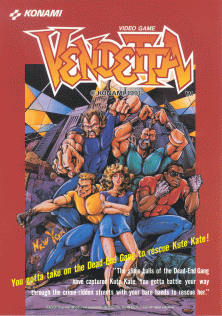
Vendetta, known in Japan as Crime Fighters 2 (クライムファイターズ2), is a 1991 side-scrolling beat-'em-up arcade game developed and published by Konami. It is the sequel to 1989 Konami's Crime Fighters, although it was marketed internationally as a stand-alone game with no previous connections.

Double Dragon is a 1987 beat 'em up video game developed by Technōs Japan and distributed by Taito for arcades across Asia, North America and Europe. It is the first title in the Double Dragon franchise. The game's development was led by Yoshihisa Kishimoto, and it is a spiritual and technological successor to Technos' earlier beat 'em up, Nekketsu Kōha Kunio-kun (1986), released outside of Japan by Taito as Renegade; Kishimoto originally envisioned it as a direct sequel and part of the Kunio-kun series, before making it a new game with a different cast and setting.
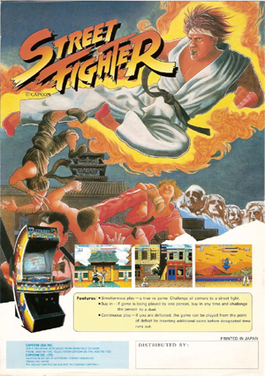
Street Fighter is a 1987 arcade game by Japanese developer and publisher Capcom. It is the first competitive fighting game produced by the company and the first installment in the Street Fighter series. It was a commercial success in arcades and introduced special attacks and some of the conventions made standard in later fighting games, such as the six-button controls and the use of command-based special moves.

A beat 'em up is a video game genre featuring hand-to-hand combat against a large number of opponents. Traditional beat 'em ups take place in scrolling, two-dimensional (2D) levels, while a number of modern games feature more open three-dimensional (3D) environments with yet larger numbers of enemies. The gameplay tends to follow arcade genre conventions, such as being simple to learn but difficult to master, and the combat system tends to be more highly developed than other side-scrolling action games. Two-player cooperative gameplay and multiple player characters are also hallmarks of the genre. Most of these games take place in urban settings and feature crime-fighting and revenge-based plots, though some games may employ historical, science fiction or fantasy themes.
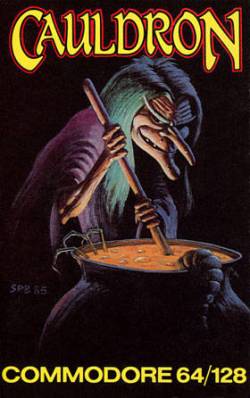
Cauldron is a video game developed and published by British developer Palace Software in 1985 for the ZX Spectrum, Commodore 64, and Amstrad CPC home computer. It contains both platform game and horizontally scrolling shooter sections. Players control a witch who aims to become the "Witch Queen" by defeating the "Pumpking"

Navy SEALS is a shoot 'em up platform video game developed and published by Ocean Software. It was first released in the United Kingdom for the Amstrad CPC, Amstrad GX4000 and Commodore 64 in 1990. It was later re-released in the rest of Europe for the ZX Spectrum, Atari ST and Amiga home computers in the following year. It was then ported to the Game Boy on 1 September 1991 in the United States. The game is based on the film of the same name and follows the protagonist, Lieutenant Dale Hawkins, progressing through five side-scrolling levels.

Sky Fox is a 1987 arcade video game developed by Jaleco and licensed to Nichibutsu. It was originally released in Japan and Europe as Exerizer (エクセライザー) as an indirect follow-up to Jaleco's 1983's Exerion and 1984's Exerion II: Zorni. It is a fixed shooter, setting the player in the role of a space pilot fighting against female alien invaders and space monsters under their control. The game was mostly well-received by Western game critics, albeit some criticized it for its depiction of women.

Bad Street Brawler, originally released for home computers as Bop'n Rumble in North America and as Street Hassle in Europe, is a 1987 video game by Beam Software. Versions were released for the ZX Spectrum and Commodore 64 and MS-DOS by Melbourne House and Mindscape with a NES version following in 1989. The NES version was one of only two games specifically designed for use with Mattel's Power Glove.
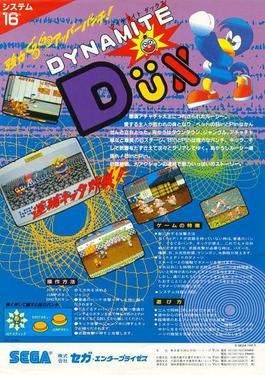
Dynamite Düx is a beat 'em up video game developed by Sega AM2 and released by Sega for arcades in 1988. Produced by Yu Suzuki and with music composed by Hiroshi Kawaguchi, the game uses the Sega System 16 arcade board, the same board used for Golden Axe and Altered Beast. It was ported to the Master System, Amiga, Amstrad CPC, Atari ST, Commodore 64, and ZX Spectrum platforms in the following year. A Mega Drive version was planned but never released.

Alchemist is an action-adventure game for the ZX Spectrum and released by Imagine Software in 1983. The player controls an alchemist who can shape-shift into a golden eagle.

Cobra is a 1986 platform game based on the film of the same name. It was developed and published by Ocean Software, and was released in Europe for Amstrad CPC, Commodore 64 (C64), and ZX Spectrum. By 1990, it received a budget re-release.

Light Force is a 1986 vertically scrolling shooter designed by Greg Follis and Roy Carter, developed by their company Gargoyle Games, and published under their Faster Than Light imprint. It was released for the Amstrad CPC, Commodore 64, and ZX Spectrum platforms.

Thanatos is an action game developed and published by Durell Software in 1986 for the ZX Spectrum, Commodore 64 and Amstrad CPC.

The Real Ghostbusters is a 1987 shoot 'em up arcade game developed and published by Data East in the United States. It is loosely based on the animated series of the same name. In Japan, Data East released it as a non-Ghostbusters arcade game under the title Meikyuu Hunter G. In 1989, Activision published The Real Ghostbusters for Amiga, Amstrad CPC, Atari ST, Commodore 64, and ZX Spectrum.
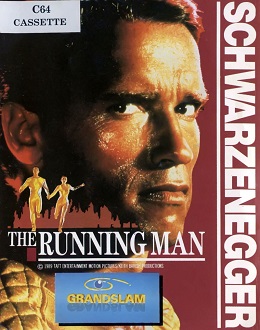
The Running Man is a 1989 beat 'em up video game based on the 1987 film of the same name. It was developed by Emerald Software and published by Grandslam Entertainments for Amiga, Amstrad CPC, Atari ST, Commodore 64, and ZX Spectrum.

Terminator 2: Judgment Day is a 1991 action video game developed by Dementia and published by Ocean Software. It is based on the 1991 film of the same name, and was released in Europe for Amiga, Amstrad CPC, Atari ST, Commodore 64, DOS, and ZX Spectrum. It is a sequel to The Terminator, itself based on the 1984 film of the same name. The game features several gameplay styles such as driving, fighting, and puzzle-solving.
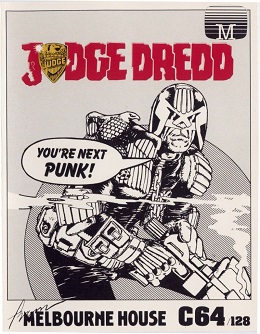
Judge Dredd is a platform shoot 'em up video game based on the character of the same name. It was developed by Beam Software and published by Melbourne House. It was released in Europe in 1986, for Commodore 64 and ZX Spectrum.

Judge Dredd is a 1990 platform shoot 'em up video game based on the character of the same name. It was developed by Random Access and published by Virgin Mastertronic. It was released in Europe in 1990, for the Amiga, Atari ST, Commodore 64, and ZX Spectrum. Critics found the gameplay repetitive.
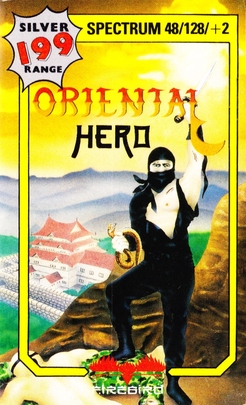
Oriental Hero is a ninja-themed side-scrolling beat-'em-up video game which was published in 1987 exclusively for the ZX Spectrum by the Firebird Software Silver Range label. The game was developed by Tron Software and is the sequel to their earlier multi-computing-platform effort, Ninja Master (1986).



















